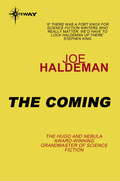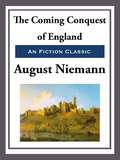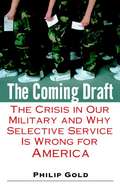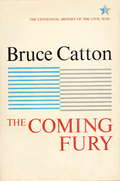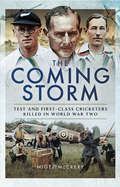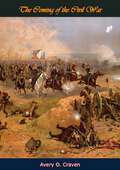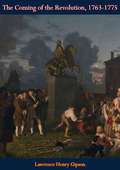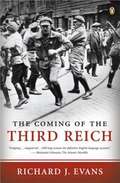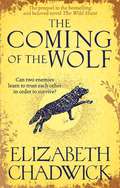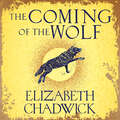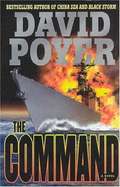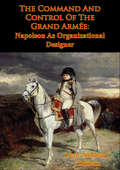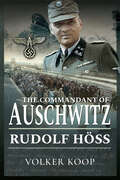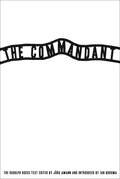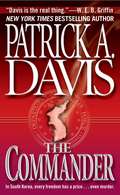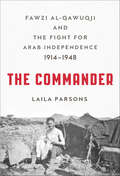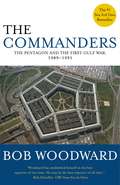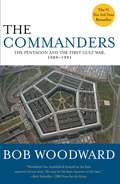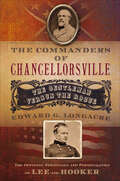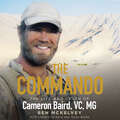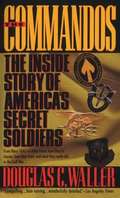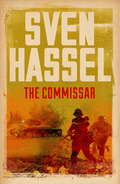- Table View
- List View
The Coming
by Joe HaldemanAstronomy professor Aurora 'Rory' Bell gets a message from space that seems to portend the arrival of extraterrestrial visitors. According to her calculations, whoever is coming will arrive in three months - on New Year's Day to be exact.A crowded and poisoned Earth is moving toward the brink of the last world war - and is certainly unprepared to face invasion of any kind. Rory's continuing investigation leads her to wonder if it could be some kind of hoax, but the impending 'visit' takes on a media life of its own. And so the world waits. But the question still remains as to what, exactly, everyone is waiting for...
The Coming Conquest of England
by August NiemannThe Coming Conquest of England is a classic utopian novel that displayed the German lust for world domination long before either of the two world wars.
The Coming Draft: The Crisis in Our Military and Why Selective Service Is Wrong for America
by Philip GoldA frustrating war and an endless occupation. The very real prospect of more conflict overseas. A military stretched beyond its breaking point. The stage is set for the resumption of the draft. Now, in an explosive and provocative book, Philip Gold, a former Marine and a disaffected conservative, reveals why selective service should never come to pass but might.
The Coming Fury (The American Civil War Trilogy #1)
by Bruce CattonWinner of the Pulitzer Prize and the National Book Award! A thrilling, page-turning piece of writing that describes the forces conspiring to tear apart the United States--with the disintegrating political processes and rising tempers finally erupting at Bull Run. " . . . a major work by a major writer, a superb recreation of the twelve crucial months that opened the Civil War." --The New York Times
The Coming Storm: Test and First-Class Cricketers Killed in World War Two
by Nigel McCreryThe outbreak of the Second World War came towards the closing stages of the 1939 cricket season. Hitler permitted us almost to complete an exceptionally interesting season, Sir Home Gordon, wrote in the Cricketer magazine, When shall we see the stumps pitched again?As the West Indies touring team canceled their last five matches and sailed home before the U-boat threat developed, the treasures at Lords, including the Ashes, were sent to a secret location for safekeeping. The Marylebone Cricket Club cancelled its tour to India - England played under the MCC banner then.During the ensuing conflict twelve test cricketers (five English, two South Africans, one Australian and one New Zealander) perished together with 130 first class players. In this superbly researched sequel to Final Wicket, covering cricketing fatalities during The Great War, this book reveals each mans career details, including cricketing statistics, and the circumstances of death. There is also a brief history of the game during the War. Arguably the period between the two world wars was the golden age of cricket, and this book honors those who made it so only to die serving their countries in a different way.
The Coming of the Civil War [First Ed.]
by Avery O. CravenExcellent and detailed account of the causes behind the American Civil War by eminent historian Avery O. Craven."In recent years a highly industrious school of historians has begun asking whether the war should have been fought at all and whether it was perhaps not more the fault of the North than of the South. Seeking to revise earlier judgments they have become known as the revisionists, and one of the most gifted and studious of them all is Avery Craven, whose The Coming of the Civil War...is one of the landmarks of revisionist literature."—Bruce Catton, American Heritage"...those who would examine the democratic process during a period of progressive breakdown, in order to understand the dangers it embodies within itself, will find The Coming of the Civil War a classic analysis."—Louis D. Rubin, Jr., Sewanee Review"The book has always been recognized, even by its most severe critics, as a work of consummate scholarship."—T. Harry Williams, Baton Rouge Morning Advocate
The Coming of the Revolution, 1763-1775: The New American Nation Series
by Lawrence Henry GipsonA short history of the "rise of that historical movement which culminates in American secession from the British Empire. Includes descriptions of the individual colonies and their characteristics.”“Professor Gipson’s magisterial narrative of the Revolutionary movement within the thirteen American colonies meets both the special needs of the editors and the high standards of the author—an achievement that is not, as we have learned from other books in other series, the easiest thing in the scholarly world to bring off successfully. Out of the massive rock of this knowledge and understanding of the British Empire in America, he has carved a gem of descriptive narration and reflective judgment. The Coming of the Revolution is ‘pure Gipson,’ that is to say, a book about early America that is documented with severity, written with clarity, and marked by a measured, one might almost say Franklinian, affection for the old Empire.”—CLINTON ROSSITER, The Annals of The American Academy for Political and Social Science“Like all his work, this bears all the marks of sound learning, just temper, and love of truth and reality. This, surely, is the best short history of the rise of that historical movement which culminates in American secession from the British Empire.”—ROSS J. S. HOFFMAN, Fordham University
The Coming of the Third Reich: A History
by Richard J. EvansFrom one of the world's most distinguished historians, a magisterial new reckoning with Hitler's rise to power and the collapse of civilization in Nazi Germany. In 1900 Germany was the most progressive and dynamic nation in Europe, the only country whose rapid technological and social growth and change challenged that of the United States. Its political culture was less authoritarian than Russia's and less anti-Semitic than France's; representative institutions were thriving, and competing political parties and elections were a central part of life. How then can we explain the fact that in little more than a generation this stable modern country would be in the hands of a violent, racist, extremist political movement that would lead it and all of Europe into utter moral, physical, and cultural ruin?
The Coming of the Third Reich: How The Nazis Destroyed Democracy And Seized Power In Germany (The History of the Third Reich #1)
by Richard J. EvansThere is no story in twentieth-century history more important to understand than Hitler's rise to power and the collapse of civilization in Nazi Germany. With The Coming of the Third Reich, Richard Evans, one of the world's most distinguished historians, has written the definitive account for our time. A masterful synthesis of a vast body of scholarly work integrated with important new research and interpretations, Evans's history restores drama and contingency to the rise to power of Hitler and the Nazis, even as it shows how ready Germany was by the early 1930s for such a takeover to occur. The Coming of the Third Reich is a masterwork of the historian's art and the book by which all others on the subject will be judged.
The Coming of the Wolf: The Wild Hunt series prequel
by Elizabeth ChadwickShortlisted for the RNA Historical Romantic Novel AwardThe long-awaited prequel to Elizabeth Chadwick's bestselling and beloved first novel The Wild Hunt'Picking up an Elizabeth Chadwick novel you know you are in for a sumptuous ride'Daily TelegraphThe Welsh Borders, 1069 When Ashdyke Manor is attacked, Lady Christen is forced to witness her husband's murder and the pillaging of her lands at the hands of brutal Norman invaders. It seems the pain is finally over when Miles Le Gallois, Lord of Milnham-on-Wye, calls off the attack. But he has Christen's brother under armed guard and a deal to offer: her brother's freedom for her hand in marriage. Christen finds herself hastily married into the enemy side, with her brother swearing his vengeance on her new husband. Miles and Christen's precarious union invites enemies from all sides and when Miles is summoned for a lengthy campaign by the King, Christen is left to watch his lands. In the midst of war, two enemies must somehow learn to trust one another if they are to survive . . .Praise for Elizabeth Chadwick 'An author who makes history come gloriously alive'The Times 'Stunning . . . Her characters are beguiling, and the story is intriguing'Barbara Erskine 'Meticulous research and strong storytelling'Woman & Home
The Coming of the Wolf: The Wild Hunt series prequel (Wild Hunt #4)
by Elizabeth ChadwickThe long-awaited prequel to Elizabeth Chadwick's bestselling and beloved first novel The Wild Hunt'Picking up an Elizabeth Chadwick novel you know you are in for a sumptuous ride'Daily Telegraph The Welsh Borders, 1069 When Ashdyke Manor is attacked, Lady Christen is forced to witness her husband's murder and the pillaging of her lands at the hands of brutal Norman invaders. It seems the pain is finally over when Miles Le Gallois, Lord of Milnham-on-Wye, calls off the attack. But he has Christen's brother under armed guard and a deal to offer: her brother's freedom for her hand in marriage. Christen finds herself hastily married into the enemy side, with her brother swearing his vengeance on her new husband. Miles and Christen's precarious union invites enemies from all sides and when Miles is summoned for a lengthy campaign by the King, Christen is left to watch his lands. In the midst of war, two enemies must somehow learn to trust one another if they are to survive . . .Praise for Elizabeth Chadwick 'An author who makes history come gloriously alive'The Times 'Stunning . . . Her characters are beguiling, and the story is intriguing'Barbara Erskine 'I rank Elizabeth Chadwick with such historical novelist stars as Dorothy Dunnett and Anya Seton'Sharon Kay Penman 'Enjoyable and sensuous'Daily Mail'Meticulous research and strong storytelling'Woman & Home 'A riveting read . . . A glorious adventure not to be missed!'Candis
The Coming of the Wolf: The Wild Hunt series prequel (Wild Hunt #4)
by Elizabeth ChadwickShortlisted for the RNA Historical Romantic Novel AwardThe long-awaited prequel to Elizabeth Chadwick's bestselling and beloved first novel The Wild Hunt'Picking up an Elizabeth Chadwick novel you know you are in for a sumptuous ride'Daily Telegraph The Welsh Borders, 1069 When Ashdyke Manor is attacked, Lady Christen is forced to witness her husband's murder and the pillaging of her lands at the hands of brutal Norman invaders. It seems the pain is finally over when Miles Le Gallois, Lord of Milnham-on-Wye, calls off the attack. But he has Christen's brother under armed guard and a deal to offer: her brother's freedom for her hand in marriage. Christen finds herself hastily married into the enemy side, with her brother swearing his vengeance on her new husband. Miles and Christen's precarious union invites enemies from all sides and when Miles is summoned for a lengthy campaign by the King, Christen is left to watch his lands. In the midst of war, two enemies must somehow learn to trust one another if they are to survive . . .Praise for Elizabeth Chadwick 'An author who makes history come gloriously alive'The Times 'Stunning . . . Her characters are beguiling, and the story is intriguing'Barbara Erskine 'I rank Elizabeth Chadwick with such historical novelist stars as Dorothy Dunnett and Anya Seton'Sharon Kay Penman 'Enjoyable and sensuous'Daily Mail'Meticulous research and strong storytelling'Woman & Home 'A riveting read . . . A glorious adventure not to be missed!'Candis
The Command (A Dan Lenson Novel #8)
by David PoyerAfter receiving the Congressional Medal of Honor for action in Iraq, Commander Daniel V. Lenson is given new orders: "Take over as skipper of USS Thomas W. Horn." His mission: Prepare the Tomahawk-equipped strike destroyer and her crew for the Red Sea, where she'll join an international task force searching for weapons of mass destruction. But this will be no routine deployment. Horn will be the first U.S. Navy warship ever to deploy with an integrated male and female crew-a controversial and politically explosive experiment that will raise questions about morale, behavior, training, sexual attraction, and ultimately, performance under fire. Facing sandstorms, smugglers, and ambushes, Horn's increasingly polarized crew will conduct demanding, diplomatically sensitive search-and-seizure operations against foreign vessels attempting to smuggle arms to Iraq. But the real nightmare is brewing in Bahrain. There, the most dangerous bomb expert in Al-Qaeda has targeted Horn for attack as the first step in a plan to redraw the map of the whole Middle East. With gripping action scenes and an explosive climax, The Command continues Dan Lenson's star-crossed career in a series that explores both global and deeply personal implications of honor, duty, power, and war.
The Command And Control Of The Grand Armée: Napoleon As Organizational Designer
by Lieut. Norman L. DurhamThe purpose of this thesis is to investigate Napoleon Bonaparte's command and control of the Grand Armée through the lens of organizational design. Napoleon's methodology behind the design of the Grand Armée is analyzed using modern principles of organizational design. The structure that Napoleon created within his organizational design was a vast information network that served as the framework for a highly effective command and control system. This command and control network allowed Napoleon to dominate a war with his enemies within the information domain.The Grand Armée transited the European countryside with lightning speed as Napoleon out maneuvered his enemies. Napoleon's dominance was a direct result of his organizational masterpiece that was the Grand Armée. From an organizational design perspective, Napoleon's methodology applied the ideas of others and exploited existing technology to affect his design.The reorganization of the military corps became one of the most important transformations made by Napoleon. The army corps was considered a key component in Napoleon's strategic deployments. The command and control system he engineered for his corps was essential in the Napoleonic philosophy to march divided and fight united.
The Commandant of Auschwitz: Rudolf Höss
by Volker KoopThe renowned WWII historian&’s definitive biography of the notorious German SS officer convicted of war crimes for his role in the Holocaust. Described as one of the greatest mass-murderers in history, Rudolf Höss was the longest-serving commandant of the Auschwitz concentration and extermination camps in Nazi-occupied Poland. He was one of the chief architects behind Hitler&’s Final Solution. In The Commandant of Auschwitz, Volker Koop details Höss&’s military career, his conversion to Nazi ideology, and his ruthless commitment to the Nazi cause. At the age of fourteen, Höss joined the 21st Regiment of Dragoons and rose through the ranks to become the youngest non-commissioned officer in the German Army. After joining the Nazi party in 1922, he was convicted of participating in at least one political assassination, for which he spent six years in prison. In 1934, Höss became a Block Leader at Dachau concentration camp. By 1940, he would be given command of his own camp near the town of Auschwitz. Charged with carrying out the Final Solution of the Jewish question, Höss set about his task with relish. By his own estimation, he was responsible for the deaths of at least 3,000,000 individuals. Justice caught up with Höss after the German surrender. He was arrested on March 11th, 1946, after a year of posing as a gardener under a false name. He was found guilty of war crimes and hanged on April 16th, 1947.
The Commandant of Auschwitz: Rudolf Höss
by Volker KoopThe renowned WWII historian&’s definitive biography of the notorious German SS officer convicted of war crimes for his role in the Holocaust. Described as one of the greatest mass-murderers in history, Rudolf Höss was the longest-serving commandant of the Auschwitz concentration and extermination camps in Nazi-occupied Poland. He was one of the chief architects behind Hitler&’s Final Solution. In The Commandant of Auschwitz, Volker Koop details Höss&’s military career, his conversion to Nazi ideology, and his ruthless commitment to the Nazi cause. At the age of fourteen, Höss joined the 21st Regiment of Dragoons and rose through the ranks to become the youngest non-commissioned officer in the German Army. After joining the Nazi party in 1922, he was convicted of participating in at least one political assassination, for which he spent six years in prison. In 1934, Höss became a Block Leader at Dachau concentration camp. By 1940, he would be given command of his own camp near the town of Auschwitz. Charged with carrying out the Final Solution of the Jewish question, Höss set about his task with relish. By his own estimation, he was responsible for the deaths of at least 3,000,000 individuals. Justice caught up with Höss after the German surrender. He was arrested on March 11th, 1946, after a year of posing as a gardener under a false name. He was found guilty of war crimes and hanged on April 16th, 1947.
The Commandant: An Account by the First Commanding Officer of Auschwitz
by Rudolf HoessThis chilling memoir presents “a graphic and compelling self-portrait” of the Nazi war criminal who oversaw Auschwitz concentration camp (Jewish Book World).SS officer Rudolph Hoess was the longest-serving commandant of Auschwitz. After the war, he was convicted of war crimes and sentenced to death by the Polish Supreme National Tribunal. The amoral sensibility Hoess displayed regarding all that went on in the charnel factory where the industrialization of death was practiced—where probably three million people were literally worked to death, shot or gassed—is still almost beyond belief today. Editor Jurg Amann has taken Hoess's text and produced a work of vital historical importance. The Commandant presents an excruciating insight into Hitler's Final Solution and the nature of evil itself through the prism of the Nazis' totalitarian system, one Hoess and so many others felt no need to question. Ian Buruma's introduction sets this frightening work within a both moral and historical context.
The Commander
by Patrick A. DavisAfter being unfairly denied promotion by a vindictive general, Air Force investigator Major Burton Webber resigned his commission in disgust. While working in his wife's shop outside South Korea's Osan Air Base, he's asked for help by an old friend from the service. A local Amerasian bar beauty has been savagely murdered in a lavish apartment -- and the powers that be want the case solved quickly and quietly. But when his investigation points him toward the upper echelons of both the Korean and American governments, he realizes that he's being used as a pawn in a twisted international conspiracy of money, power, and murder -- a conspiracy in which Burton Webber has just outlived his usefulness....
The Commander: Fawzi al-Qawuqji and the Fight for Arab Independence, 1914–1948
by Laila ParsonsRevered by some as the Arab Garibaldi, maligned by others as an intriguer and opportunist, Fawzi al-Qawuqji manned the ramparts of Arab history for four decades. As a young officer in the Ottoman Army, he fought the British in the First World War, and won an Iron Cross. In the 1920s, he mastered the arts of insurgency and helped lead a massive uprising against the French authorities in Syria. A decade later, he re-appeared in Palestine, where he helped direct the Arab revolt of 1936. When an effort to overthrow the British rulers of Iraq failed, he moved to Germany, where he spent much of the Second World War battling his fellow exile, the Mufti of Jerusalem, who had accused him of being a British spy. In 1947, Qawuqji made a daring escape from Allied-occupied Berlin, and sought once again to shape his region’s history. In his most famous role, he would command the Arab Liberation Army in the Arab-Israeli war of 1948.In this well-crafted, definitive biography, Laila Parsons tells Qawuqji’s dramatic story and sets it in the full context of his turbulent times. Following Israel’s decisive victory, Qawuqji was widely faulted as a poor commander with possibly dubious motives. Parsons shows us that the truth was more complex: Although he doubtless made some strategic mistakes, he never gave up fighting for Arab independence and unity, even as those ideals were undermined by powers inside and outside the Arab world.
The Commanders
by Bob WoodwardIt is impossible to examine any part of the war on terrorism in the twenty-first century without seeing the hand of Dick Cheney, Colin Powell or one of their loyalists. The Commanders, an account of the use of the military in the first Bush administration, is in many respects their story -- the intimate account of the tensions, disagreements and debates on the road to war.
The Commanders
by Bob WoodwardIt is impossible to examine any part of the war on terrorism in the twenty-first century without seeing the hand of Dick Cheney, Colin Powell or one of their loyalists. The Commanders, an account of the use of the military in the first Bush administration, is in many respects their story--the intimate account of the tensions, disagreements and debates on the road to war.It is impossible to examine any part of the war on terrorism in the twenty-first century without seeing the hand of Dick Cheney, Colin Powell or one of their loyalists. The Commanders, an account of the use of the military in the first Bush administration, is in many respects their story--the intimate account of the tensions, disagreements and debates on the road to war.
The Commanders of Chancellorsville: The Gentleman versus the Rogue
by Edward G. LongacreThe award-winning Civil War historian explores the battle between two strikingly different generals: “Fighting Joe” Hooker and Robert E. Lee.As equally matched in skill as they were opposite in personality, the brash Union Gen. Joseph Hooker boasted of a sure defeat of the reserved Gen. Robert E. Lee. “I’ve got Robert E. Lee right where I want him, and even God Himself cannot stop me from destroying him,” boasted Hooker. Yet the battle of Chancellorsville stands as Lee’s greatest triumph.The story of the two generals has never been explored as it is here. “Fighting Joe” Hooker was brilliant, but also profane and bombastic, and his army so undisciplined that their pursuit of camp “followers” spawned the modern euphemism for prostitute. Robert E. Lee, equally gifted, was known as the definitive devout, self-controlled Southern gentleman, leading an army that was exhausted, underfed, and outmanned. Chancellorsville stands not just as a pivotal battle of the Civil War but as the personal war between two warriors—stalking, striking, and counter-striking their way to ultimate victory or defeat.Praise for the work of Edward G. Longacre, a winner of the Fletcher Pratt and Douglas Southall Freeman awards“Breezy and informative . . . Longacre remains even handed throughout and maintains a lively pace.” —Publishers Weekly“Well-researched, fast paced.” —Pennsylvania History
The Commando: The life and death of Cameron Baird, VC, MG
by Ben MckelveyOn 22 June 2013, Corporal Cameron Baird was a 2nd Commando Regiment Special Forces soldier when he led his platoon into a known Taliban stronghold to back-up another Australian unit under heavy fire. In the pronged firefight, Cameron was mortally wounded. In 2014, Cameron's bravery and courage under fire saw him posthumously awarded the 100th Victoria Cross, our highest award possible for bravery in the presence of the enemy. Cameron Baird died how he lived - at the front, giving it his all, without any indecision. He will forever be remembered by his mates and the soldiers he served with in the 2nd Commando Regiment. THE COMMANDO reveals Cameron's life, from young boy and aspiring AFL player, who only missed out on being drafted because of injury, to exemplary soldier and leader. Cameron's story and that of 4RAR and 2nd Commando personifies the courage and character of the men and women who go to war and will show us the good man we have lost.
The Commandos Behind Enemy Lines
by Douglas C. WallerThese were the Army's most professional soldiers, and their most flexible. They weren't green recruits still growing~ up. They were mature warriors.
The Commissar
by Sven HasselA shocking insight into the brutalities faced by ordinary soldiers and the atrocities committed in the name of survival.Dispassionately we stared at the bloody scene. It had become an everyday sight. The 27th Penal Regiment care nothing for Hitler's war. They fight only to stay alive. But then they uncover the Soviet Army's biggest secret. A Russian commissar has hidden 30 million dollars of gold somewhere behind enemy lines. In a madcap scheme, Porta brokers a deal with the commissar: free passage for the Russians in return for a share of the gold. To find it, Sven and his comrades must be prepared to lie, steal and go behind the lines of the deadly Russian army...
